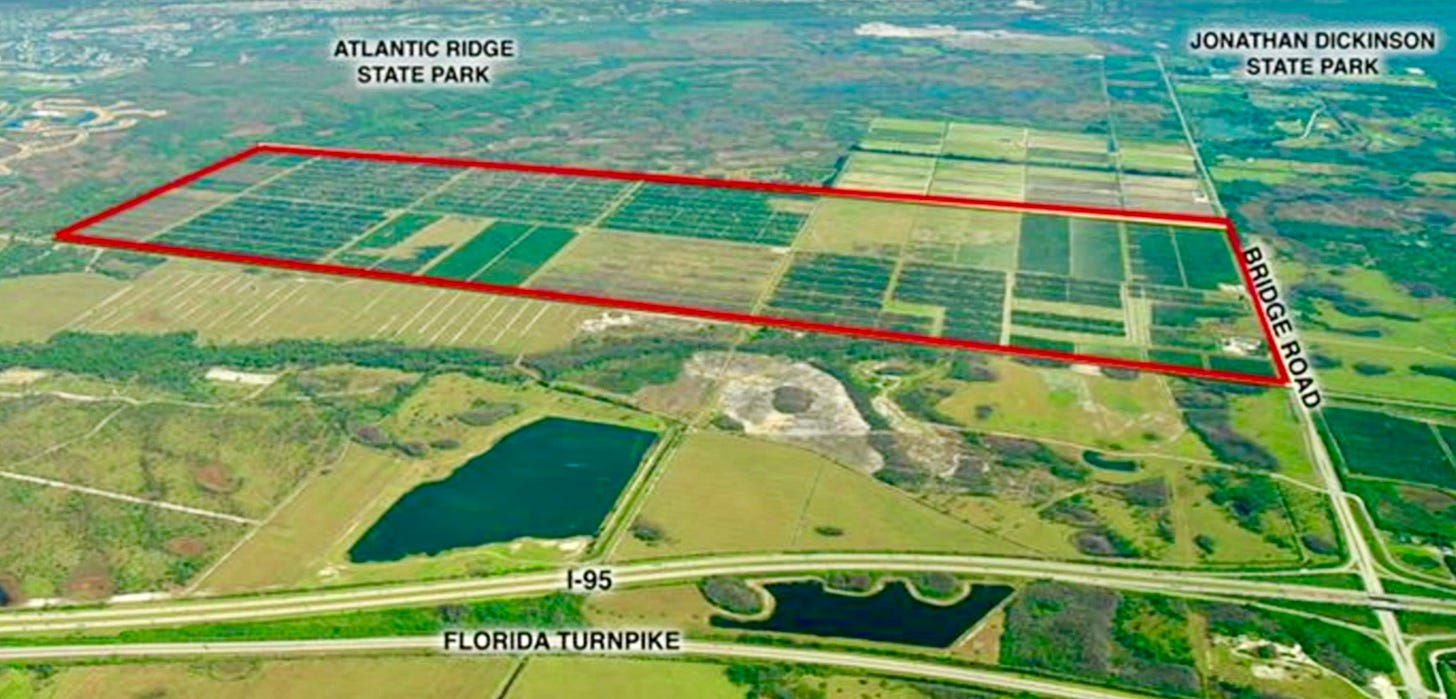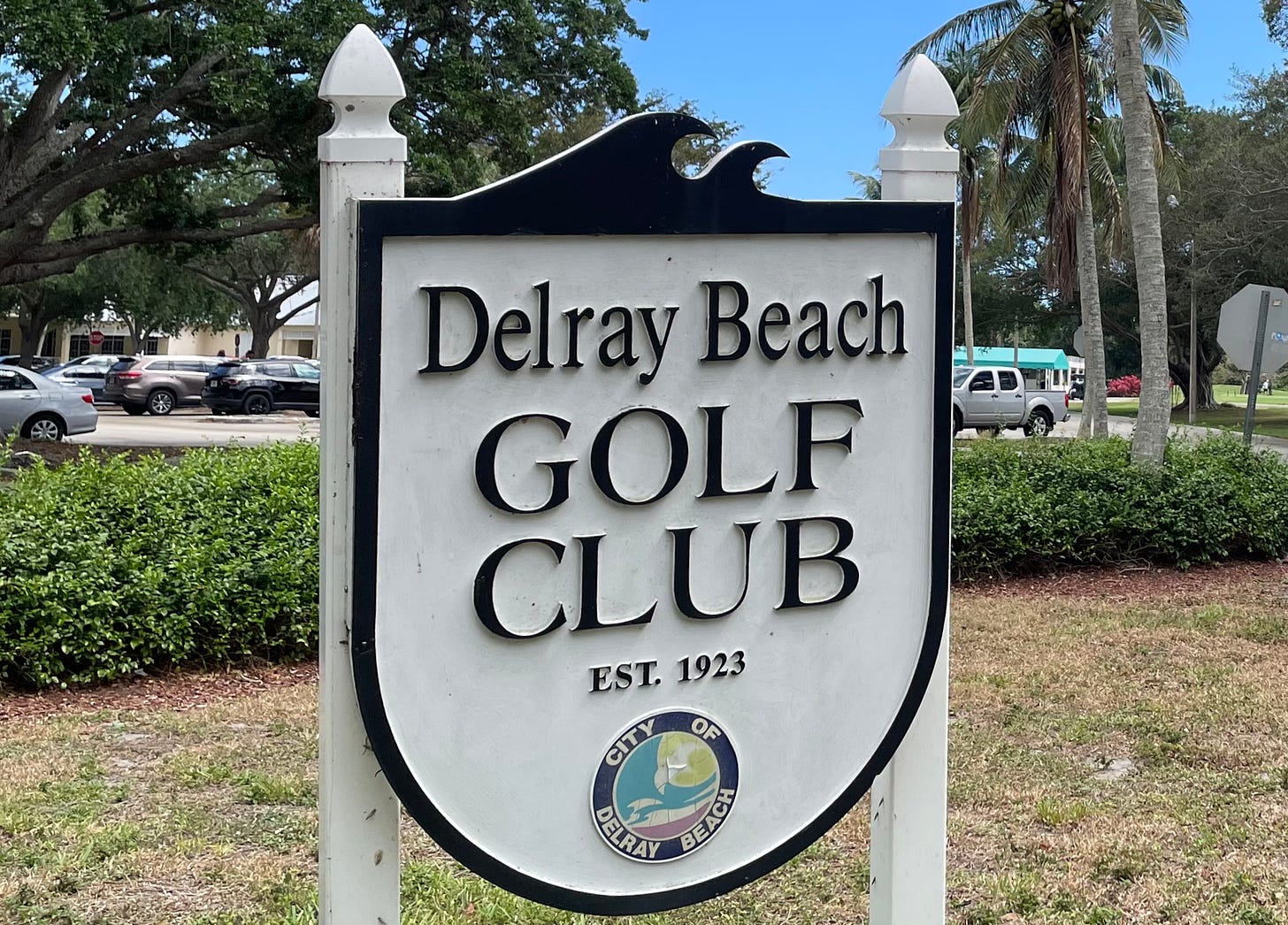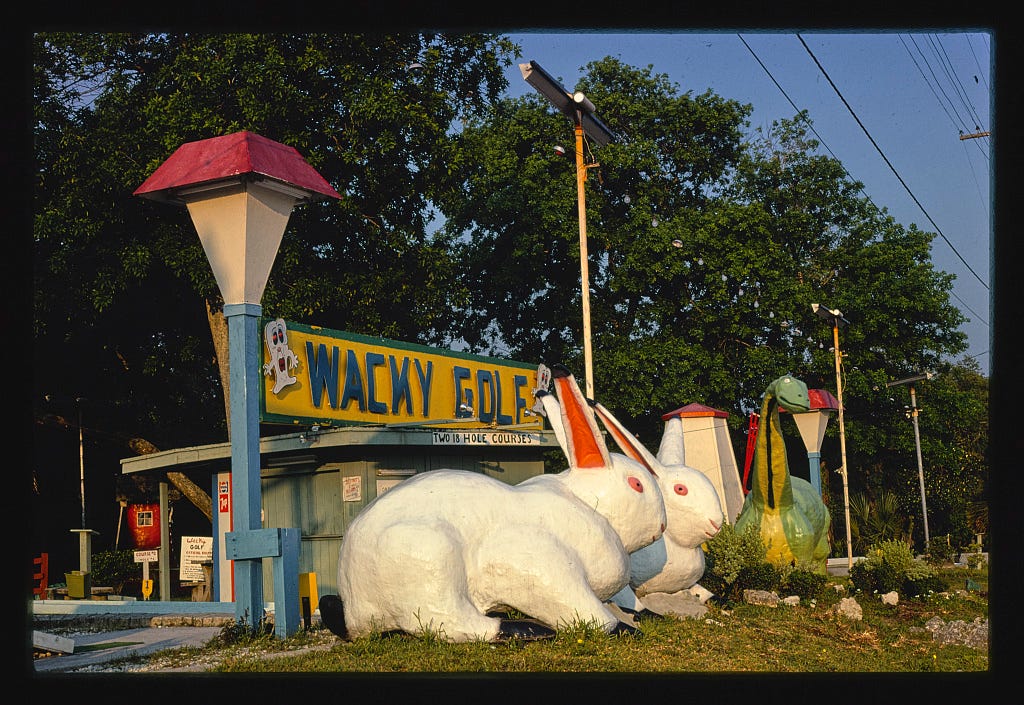⛳️ Fair play
Our Masters week golf edition. The shameful history of the remade West Palm city course; how a posh golf village could rock Martin County; Delray Beach's bogey; Putt-Putt; and the future of golf.
Today’s newsletter is a 6-minute read.
First up: West Palm Beach’s course is built on a landmark moment in the civil rights struggle

An ambitious project to reimagine West Palm Beach’s public golf course as a beacon of outreach for the game is being built on the commitment of many, but perhaps none more than the city’s determined Black golfers.
What’s happening: The Park - West Palm Beach is set to open this month at the site of the former municipal course south of Forest Hill Boulevard and just east of I-95.
Why it matters: This is an opportunity for the city to overcome the lasting damage of a decades-long policy of discrimination in the last century that barred the Black community.
Details: Under a 2020 agreement with the city, PGA of America CEO Seth Waugh launched the center with co-founders who include billionaire publishing heir Dirk Ziff. Waugh formed the West Palm Golf Community Trust and raised $55 million to construct and endow the project.
The center has the trappings of a luxury destination, including an 18-hole course, a 9-hole course, lighted driving range, walking trails on its perimeter and a clubhouse with a restaurant and event space.
The private not-for-profit has a 50-year lease on the 196-acre city property for $1 a year with an option to renew for 20 years.
The South Florida PGA will move its headquarters to the property.
The course comes with financial advantages: During an appearance in February at The Benjamin School, Waugh explained the city land carries no debt, no taxes, and no water costs.
He sees The Park as a model for the reinvention of municipal golf across the country.
Flashback: The city was hours away from selling the course to avoid “racial tension” after a federal court ruled in 1958 that Black golfers must be granted access.
The plan was to have it taken over by a private company that would choose who could play.
The course’s hidden history: Keep reading to find out what happened.
Too much growth? Bill would open door to more

Donna Melzer believes Martin County’s renowned 40-year grip on development is over, ended by a recently enacted change to the county’s comprehensive growth plan.
So the slow-growth-minded former commissioner challenged the move that allows a golf development outside the county’s rigid urban boundary, forcing a hearing before a state administrative law judge. She acted as her own attorney because, she said, it would have cost her at least $45,000 to hire one.
Discovery Land, a builder of high-end resorts, wants the change to build a golf course and 317 homes on a 1,531-acre site east of Interstate 95 and north of Bridge Road. Other golf-course developers stand in waiting, including Stephen Ross, the Miami Dolphins owner and an original partner in West Palm Beach’s CityPlace.
Why it matters: If a bill speeding through both houses of the Florida Legislature had been law, Melzer said, she would not have filed the challenge, because if she had lost she would have been required to pay for the other side’s lawyers.
On March 17, the administrative law judge in Melzer’s case came down on her side, finding that Melzer met the state’s high bar for a successful challenge in just one of a half-dozen areas she questioned.
The order may do little:
The decision has to win the blessing of the Florida Administration Commission, which is headed by Gov. Ron DeSantis and includes the other three members of the Florida Cabinet: Chief Financial Officer Jimmy Patronis, Attorney General Ashley Moody and Agriculture Commissioner Wilton Simpson.
In January, with nearly no discussion (Pages 53-55), the commission rejected an administrative law judge’s finding that blocked a Stuart Costco and 378 apartments.
If the Cabinet lets it stand, the developer or the county could remove the offending clause and try again. But that would mean taking the proposal creating a Rural Lifestyle growth category back before the Martin County Commission, a risky political proposition. The county approved the proposal 3-2 in September after months of debate.
On the horizon: Florida lawmakers are looking at adding another complication.
They are rapidly moving House Bill 359 and Senate Bill 540 toward passage. The bills would make the losing party in a comp plan challenge pay the fees of the prevailing parties. In this case, Melzer, an attorney, would have been forced to pay not only the county but an intervening party, the developer, if she had lost.
And on March 31, the Senate made the bill retroactive to January 2022, meaning if Melzer loses at the state Cabinet level she would pay.
Environmentalists say the bill is likely to have a chilling effect, blocking citizens from challenging growth.
The lawmaker sponsoring the House bill said it will stop people from filing frivolous challenges.
Citizens can restrict growth by lobbying or getting out to vote, state Rep. Wyman Duggan, R-Jacksonville, told a House committee March 23.
“If you just don’t like how the local government made their decision then I personally don’t think this is the right way to go about it, and you should have some skin in the game knowing you’re going to potentially be on the hook for fees,” Duggan said.
Read more about the growth plans for Martin County.
In Delray Beach, a swing and a whiff

A long-delayed rehab of the city-owned Delray Beach Golf Club is going to be delayed a little longer.
All four private development proposals were tabled last week.
At stake? It’s not just whether golfers get a refreshed 18-hole championship course. The four deals involved selling between 7-10 acres of the property’s 150 acres of green space to developers. They would build apartments, villas and/or a hotel.
Critics worry about increased traffic. Some balk at giving up any green space. And some don’t believe they have enough information from the city.
Delray needs the money from a land sale, according to Mayor Shelly Petrolia. A few years ago, the city estimated it could cover an estimated $3 million in renovations for the nearly 100-year-old course. But costs ballooned. The city needs private-sector partners to make an overhaul happen.
Selling land would bring the city money at the same time developers would improve everything from below-ground water lines to the clubhouse.
But commissioners could not agree on any of the four proposals. Only one, led by Related Group of Miami, even got a vote. It looks like a workshop on the golf course’s future will be scheduled.
Recently sworn-in Commissioners Rob Long and Angela Burns will be weighing in on the project the next time proposals are considered.
You can evaluate Related’s development proposal for yourself here, and the other three here, and here, and here. And video of the entire commission meeting can be viewed here.
This week’s quiz: It’s mini

Sure, you can rattle off the addresses and operating hours of every golf course in Palm Beach County. But what do you know about Putt-Putt? Can you the pro golfer whose company designed a local mini-course? Was it a Golden Bear? A Great White Shark? Or a guy who stuck a glow stick in a golf ball and invented night golf?
Drive by next week for the answer.
561 insider: Five minutes with Jeffrey Cunningham

Cardinal Newman High School graduate and professional golfer Jeffrey Cunningham is part of the future of golf.
Cunningham was a standout player at Drexel University in Philadelphia.
He is the son of the pioneering Black doctor Pamela Jeffrey Cunningham, who died in 2021, and West Palm Beach attorney F. Malcolm Cunningham Jr.
Jeffrey’s grandfather, F. Malcolm Cunningham Sr., represented plaintiffs in the discrimination case that opened the West Palm Beach city course to all.
Cunningham, 24, broke a barrier of his own last year as the first African-American finalist in the BMW Philadelphia Amateur Championship.
Stet reached Cunningham yesterday between rounds of a tournament this week at Park Ridge, Okeeheelee and Osprey Point courses.
Why pursue golf? “It has a translation to life. The hardships that you can go through in a round of golf. It’s not about what’s thrown at you, but the way you accept it and turn it into something positive.”
“I actually am just walking in from playing the Palm Beach County Open. I missed out on some opportunities. That’s why there are two more days to a tournament.”
What is your favorite course in Palm Beach County? “Park Ridge. We don’t get elevation in South Florida at all. They’ve moved some serious land around and have some pretty cool native shrubs and a different-styled layout. It’s six Par 3s, six Par 4s and six Par 5s.”
“I’ve played all three of these courses in the open, and there’s no doubt that the Palm Beach County public courses are some of the coolest things you’ll see in the world, really.”
“It’s not very common that you can find public courses this well-kept. Adding The Park that’s coming, that’s really going to add to what we’ve got down here in South Florida.”
What’s next? “I’m aspiring to be a professional golfer on the PGA Tour. I want to use the platform that I can create for myself by my ability to play this game to create more opportunities for everybody to play golf.”
We’ll see you next week. Until then, Happy Passover and Happy Easter!
Thank you for joining us and for supporting Palm Beach County journalism in the public interest. You can help us grow by sharing this newsletter.
Do you have a story idea or a news tip? Reply to this email, and tell us.





